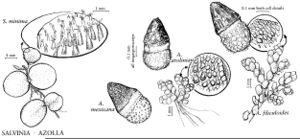Difference between revisions of "Salviniaceae"
imported>Volume Importer |
imported>Volume Importer |
||
| Line 40: | Line 40: | ||
|publication year= | |publication year= | ||
|special status= | |special status= | ||
| − | |source xml=https:// | + | |source xml=https://bitbucket.org/aafc-mbb/fna-data-curation/src/2e0870ddd59836b60bcf96646a41e87ea5a5943a/coarse_grained_fna_xml/V2/V2_654.xml |
}}<!-- | }}<!-- | ||
-->[[Category:Treatment]] | -->[[Category:Treatment]] | ||
Latest revision as of 20:24, 5 November 2020
Plants small, floating aquatics. Stems creeping, branched, bearing hairs but no true roots. Leaves in whorls of 3, with 2 leaves green, sessile or short-petioled, flat, entire, and floating, 1 leaf finely dissected, petiolate, rootlike, and pendent. Submerged leaves bearing sori that are surrounded by basifixed membranous indusia (sporocarps); sporocarps of 2 types, bearing either megasporangia that are few in number (ca. 10), each with single megaspore, or many microsporangia, each with 64 microspores. Spores of 2 kinds and sizes, both globose, trilete. Megagametophytes and microgametophytes protruding through sporangium wall; megagametophytes floating on water surface with archegonia directed downward; microgametophytes remaining fixed to sporangium wall.
Distribution
Mostly tropical, North America, Mexico, West Indies, Central America, South America, Eurasia, Africa including Madagascar.
Discussion
Genus 1, species 10 (1 species in the flora).
Selected References
None.
